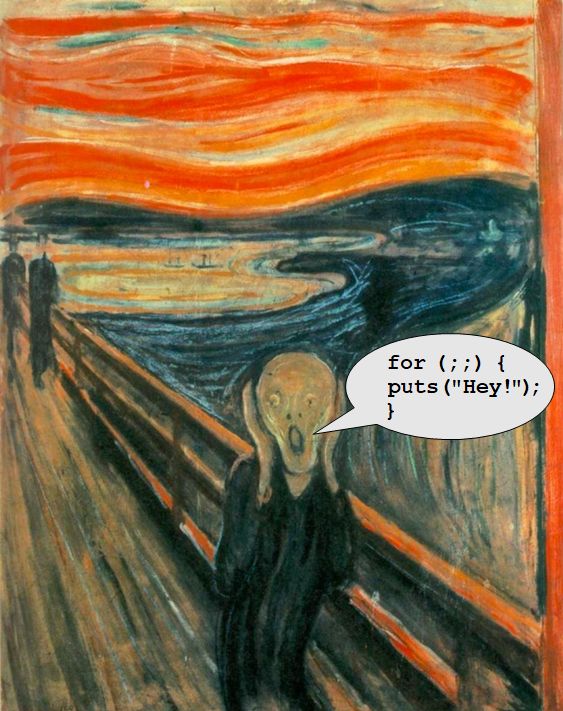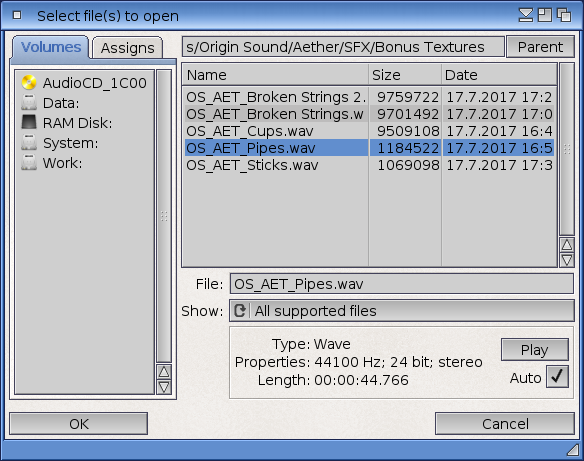Shortly after I released the first version of the Rave audio editor I received an e-mail from a fellow user, Daniel Reimann of the amiga-news.de team. He asked me where I find motivation for my Amiga projects. We exchanged a few rather general words about things that give you drive and energy in life, and then we went on to discuss other topics such as the family or holiday destinations. But the more time passed since our little conversation, the more I wondered myself: “Why do I keep doing the things I do, spending time with a computer system that only has a few hundred users?”
It’s a well-known fact that different people get motivated by different things. And it’s probably good to know what these things are: not only because they ask you at job interviews but, more importantly, to avoid making efforts that won’t give you the necessary spark anyway. Really, expecting motivation from things that motivate others (but not you) is a waste of time. So I sat down and came up with a short list of what typically makes me engaged – and as I was getting through a particularly fine bottle of Pinot Noir my wife gave me for Father’s Day, the list ultimately turned into this blog post.
For starters, I do things because I enjoy the process. Yes, I’ve realized that I’m a process-oriented person, rather than a goal-oriented one. My harddrive can testify to this. If you look into my development drawer you’ll see that it contains a lot of abandoned projects. Similarly, my old Protracker drawer has a good deal of material that are mere sketches of ideas for music. Many people would say that I’m not a finisher, that I need to set my eyes on the prize and see the ultimate result. But I can’t help it: I simply love it when I start my computer, make a cup of coffee, put on some music, and get cracking on whatever my current project is. I believe that “enjoying the creative process” is a perfectly valid reason why we do things, and in fact, it’s often a prerequisite to achieving other goals. Trying to produce a result in frustration because the creative process feels like a burden can’t come to any good.
The second item on my personal list of motivation factors is learning. While I may have decades of Amiga experience to rest on, I always learn something new when I work on a program or a piece of music. Heck, I could write a full book about what I’ve learned in the past few years working on Rave! Programming in particular may seem a mundane and repetitive activity but in fact, you rarely get the “been there, done that” feeling. The creative process always makes you face new challenges, bringing in return deeper insight and new skills.
By nature I’m not a noisy person, so I wouldn’t find it appropriate to express my inner self like the guy in Edvard Munch’s famous painting The Scream. Instead, I use creativity as an outlet. Not that I fire up MilkyTracker to compose a brooding song every time I feel a bit on the low side, or a club banger when I need to let off steam! But the various psychological aspects of creative work can also act as great motivators. I personally like the idea that we leave a bit of ourselves in the things we make; a personal imprint if you will. It’s obvious in music and other artworks, which often stem from emotions and thoughts of a very private nature. But it doesn’t stop with art: I strongly believe that programming is a form of expression too, and as such it bears traces of your thinking, attitude, decision-making and solution-finding. I don’t care that the end user most likely can’t see them: knowing that the software will contain something that is uniquely mine helps me see my efforts as worthwhile and rewarding.
And of course, speaking of psychological aspects, we all know that work can be a great way to take your mind off things. The activities I like to do on the Amiga require a lot of patience and concentration, so when I start working on a software project or a tune, I soon realize that my mental capacity is fully occupied with what I’m doing. This often feels very relaxing, paradoxical as it may sound. So I don’t find it particularly hard to jog myself into working on an Amiga project, because I know that I’ll be in fact taking a little break from the troubles and pressures of the world.
Next on my list is what I think psychology calls social approbation: the notion of being valued by the community. Between the years 2000 and 2009 I was a normal Windows user, and I tried to build on my Amiga hobby by running a small home studio for music production. Far from a professional affair but still, some ten thousand euros sank into it over the years, so I was able to do things I wouldn’t have imagined in the old Amiga days. But nobody seemed to care what I was doing because there were thousands of people like me. Thousands of bedroom composers trying to reach an audience! The situation was no less frustrating in programming. Whenever I thought of a project I could do, I found out that a similar piece of software already existed, with a dozen competing alternatives.
On the PC, I got very little feedback on my work, which ruined my sense of achievement. In the end I didn’t get any joy from my hobby because I felt I wasn’t making any contribution to anybody. And so I realized that I need to feel that I’m useful to get motivated. The Amiga gives me that feeling: the community is small, so it’s much easier for your work to get noticed and appreciated. It doesn’t take ages to establish a reputation if you’re good enough. Unlike on Windows, a lot of software is still missing, so as a programmer you never get short of ideas for new projects. The Rave editor came into existence because I felt there was a gap to be filled, and that AmigaOS4 was losing to its Classic counterpart in the music department. I wanted to change that and give people one more reason to use their system. I wanted OS4 to have something unique.
Which takes me to the last item on my list: bringing innovation. I know that the word “innovation” is somewhat relative on our platform, but still, my motivation levels run high when I know I can bring something new to the old Amiga table. Although still in its infancy, Rave can already boast a number of “Amiga firsts”, and not only because it’s the first native AmigaOS4 sample editor in thirteen years. The program’s I/O module is based on industry-standard libraries, providing the widest range of audio formats ever supported by an Amiga editor. For the latest version, I went to some trouble to introduce preview playback in the file requester – something I always missed on the Amiga. I have a massive library of samples (we’re talking several dozen gigabytes), and looking for the right sound has become a tedious process, much like seeking the proverbial needle in a haystack. There’s still room for improvement, but I can honestly tell you that the new feature really improves workflow and saves a lot of time.
Now all we need is more AmigaOS4 musicians and sound tinkerers. Oh, that would send my motivation levels right through the ceiling! 🙂


